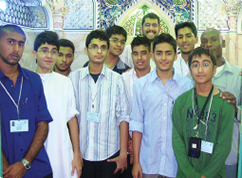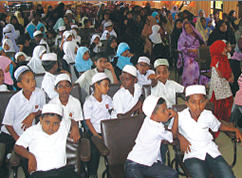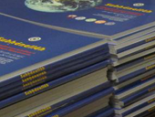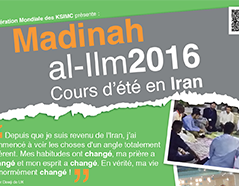The World Federation is pleased to introduce a series of videos to help us acquire closeness to Allah (swt). The first 5 videos will be an Introduction to Shahr Ramadan and for the rest of the Holy month we will focus on Akhlaq. Click here to watch Day Eight.
Rajab al-Asabb
Although Allah is the creator of time and we as Muslims should value our days and nights, our Lord shows us in the Quran that some time periods are more sacred than others. Rajab is one of those months whose mention has been made in the Quran, in the 36th verse of Surah al-Tawbah (9) in which Allah says:
إِنَّ عِدَّةَ الشُّهُورِ عِندَ اللَّهِ اثْنَا عَشَرَ شَهْرًا فِي كِتَابِ اللَّهِ يَوْمَ خَلَقَ السَّمَاوَاتِ وَالْأَرْضَ مِنْهَا أَرْبَعَةٌ حُرُمٌۚ ذَٰلِكَ الدِّينُ الْقَيِّمُۚ …
Verily, the number of months with Allah is twelve months (in a year) according to the law of Allah since the day He created the heavens and the earth. Of these four (months) are sacred (- Rajab, Muharram, Dhul-Qa`dah and Dhul-Hijjah)…
The Divine Wisdom has decreed that during this holy month, there must be a cessation of all hostility in order to enable the believers to engage in spiritual purification through the recommended acts of fasting, prayers, frequent supplications to Allah, thinking of the less fortunate through charity and the greatest acts of self-building, performance of the umrah and the Ziyarat to the blessed shrines of the infallibles, peace be upon them all. These are acts of devotion which can be performed at any time of the year, however when done in Rajab, their rewards are magnified by Allah. The spiritual guides remind us that the Arabs of the period of jahiliyya observed a cessation of hostility in this sacred month, and taking inspiration from this, us as believers, guided by Divine enlightenment, should also strive to end conflicts around us – especially those within the family, community, etc.
One of the unique qualities of Rajab is that it has been referred to as al-Asabb (الأصب) which in Arabic, means “the flooding” – and in the context of the 7th lunar month of Rajab, this is a month in which the flood of Divine Mercy will reach those who engage in the extra acts of worship – especially asking forgiveness from Allah (istighfar) and much supplications and doing our best to engage in the highly recommended acts of worship performed on the 13th, 14th and 15th of this blessed month – a period known as ayyam al-beedh or the Days of Luminosity. One of the physical characteristics of these three nights is that the moon is at its brightest, however on the spiritual side, these three nights provide extra spiritual enlightenment and the a’maal (acts of worship) on these nights further aid the believer in removing any spiritual darkness which they may be enveloped within.
One of the highly recommended acts of Rajab is that of fasting, this act protects the believer from hell and qualifies the individual to benefit from the Divine pleasure.
Some of the traditions which speak about fasting in Rajab give us the following guidance:
It is narrated from the Prophet (ṣ) that he said: “The month of Rajab is the great month of Allah. No month [other than Ramadhan which is the greatest month according to other hadith] can come close to matching its sanctity and grace. Fighting (initiatively) the [aggressor] disbelievers in it is prohibited (unless they initiate a war, 2:194). Indeed, Rajab is the month of Allah, while Sha‘ban is my month and (the month of) Ramaḍhan is the month of my community. Surely, the one who fasts (even) one day in (the month of) Rajab deserves the greatest pleasure of Allah. The wrath of Allah moves away from him, and a door from the doors of hell is closed for him.”
The seventh Imam, Musa b. Jaʿfar (‘a) (d. 183 AH / 799 AD) said: “Whoever fasts one day in the month of Rajab has the fire (of hell) kept away from him the distance of one year, while whoever fasts three days (in this month) has paradise become incumbent for him.”
In his work, Mafaatih al-Jinan, Shaykh ‘Abbas al-Qummi (d. 1359 AH / 1940 AD) suggests that if one does wish to fast three days in this month, he should choose to fast on Thursday, Friday, and Saturday since it is narrated that: “Whoever fasts these three days in any of the Sacred months will have Allah reward him with the reward applicable to the worship of nine hundred years.”
The seventh Imam (‘a) has also said: “Rajab is (the name of) a river in paradise. Its color is whiter than milk; its taste is sweeter than honey. Whoever fasts one day in (the month of) Rajab will have Allah quench his thirst from that river.”
The sixth Imam al-Sadiq (‘a) (d. 148 AH / 765 AD) transmits the following report from the Prophet of Allah (s), who said: “(The month of) Rajab is the month of seeking repentance for my community, so increase the seeking of repentance in it for He (Allah) is Forgiving and Merciful. This month is called “al-Rajab al-Asabb” (i.e. the [month of] Rajab in which there is an abundant and excessive outpouring and flow). This is because the mercy of Allah flows on my community (in this month) with abundant exuberance. Therefore dedicate yourselves with increasing intensity to the recitation of the formula:
أَسْتَغْفِرُ اللَّهَ وَ أَسْئَلُهُ التَّوْبَةَ
Astaghfirullaha wa asʾaluhu al-tawba
(Translation: I seek Allah’s forgiveness and I beseech His repentance).
Reminder: Since its not allowed to fast a recommended fast when a person still has pending qadha of obligatory (wajib) fasts, then in the month of the “Flood of Mercy”, the person must perform the qadha fast first and also hope for extra Divine mercy promised from the Month of Rajab fasts.
We should try our best to fast the entire month, in following the sunnah of the Noble Prophet, prayers of Allah be upon him and his family, however if that is not possible, then at least a few days of the month, and if that too is not possible, then at least keep the fast for one day.
In regards to giving charity (sadaqa) the hadith tells us that we should protect ourselves from the fire of hell with whatever charity we can give – even something as little as a piece of date. Charity in its widest sense includes all acts of kindness to all living beings!
The connection to Allah can be further strengthened via supplications (dua). There are several supplications which are recommended to be recited this month to enable even greater levels of closeness and the believers can refer to books such as Mafaatih al-Jinan with translations available.
If one has the means and Allah grants them the tawfeeq, then the performance of the umrah and the Ziyarat of the five masumeen, peace be upon them all, in the blessed city of Medina should be performed in this blessed month.
In addition, the traditions tell us that the performance of the Ziyarat of Imam al-Husayn, peace be upon him, in this month would qualify a person for the special Divine Pardon.
Lastly, the Ziyarat of the 8th Imam, Ali ibn Musa al-Ridha, peace be upon them both, qualifies the individual for the reward of performing multiple recommended umrah and also hajj.
As we keep in mind the following important historical dates which remain in this blessed month:
• Birth of Imam Ali, peace be upon him, inside the Kabah;
• Wafat of Sayyida Zaynab binte Ali, peace be upon them both, the propagator of the tragedy of Kerbala and defender of the cause of Imam al-Husayn, peace be upon him;
• Martyrdom of the 7th Imam, Musa ibn Ja’far al-Kadhim, peace be upon them both;
• Wafat of the protector and nurturer of the Prophet, Abu Talib, peace be upon him;
• Bi’that (official open appointment) of Prophet Muhammad, prayers of Allah be upon him and his family, to the station of Prophethood as the seal of the Prophets.
Related News
Read here about the diverse number of programs and events, with the primary focus of external tableegh, which were organised in Kathmandu, Nepal, during April, May and June 2019 by Moulana Mohammed Zainul Abedin.
The inception of Meraj Educational Publishers of Bilal Muslim Mission of Scandinavia - Märsta - Sweden took place in 1988 after a trip for the Holy Ziyarat of Iraq.










